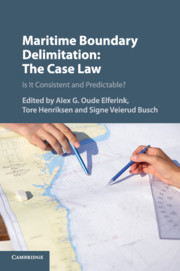Book contents
- Maritime Boundary Delimitation: The Case Law
- Maritime Boundary Delimitation: The Case Law
- Copyright page
- Contents
- Figures
- Tables
- Contributors
- Preface
- Abbreviations
- Table of Cases
- International Instruments
- 1 The Judiciary and the Law of Maritime Delimitation
- 2 The Delimitation of the Territorial Sea, the Continental Shelf, and the EEZ
- 3 Entitlement to Maritime Zones and Their Delimitation
- 4 The Applicable Law
- 5 Provisional Measures and Provisional Arrangements
- 6 The Role of Equity, Equitable Principles, and the Equitable Solution in Maritime Delimitation
- 7 Relevant Coasts and Relevant Area
- 8 The Provisional Equidistance Line
- 9 Relevant Circumstances
- 10 The Case Law's Handling of Issues Concerning Third States
- 11 The Disproportionality Test in the Law of Maritime Delimitation
- 12 The Delimitation of the Continental Shelf beyond 200 nm
- 13 The Delimitation of the Continental Shelf beyond 200 nm
- 14 Conclusions
- Bibliography
- Index
3 - Entitlement to Maritime Zones and Their Delimitation
In the Doldrums of Uncertainty and Unpredictability
Published online by Cambridge University Press: 23 February 2018
- Maritime Boundary Delimitation: The Case Law
- Maritime Boundary Delimitation: The Case Law
- Copyright page
- Contents
- Figures
- Tables
- Contributors
- Preface
- Abbreviations
- Table of Cases
- International Instruments
- 1 The Judiciary and the Law of Maritime Delimitation
- 2 The Delimitation of the Territorial Sea, the Continental Shelf, and the EEZ
- 3 Entitlement to Maritime Zones and Their Delimitation
- 4 The Applicable Law
- 5 Provisional Measures and Provisional Arrangements
- 6 The Role of Equity, Equitable Principles, and the Equitable Solution in Maritime Delimitation
- 7 Relevant Coasts and Relevant Area
- 8 The Provisional Equidistance Line
- 9 Relevant Circumstances
- 10 The Case Law's Handling of Issues Concerning Third States
- 11 The Disproportionality Test in the Law of Maritime Delimitation
- 12 The Delimitation of the Continental Shelf beyond 200 nm
- 13 The Delimitation of the Continental Shelf beyond 200 nm
- 14 Conclusions
- Bibliography
- Index
Summary
- Type
- Chapter
- Information
- Maritime Boundary Delimitation: The Case LawIs It Consistent and Predictable?, pp. 62 - 91Publisher: Cambridge University PressPrint publication year: 2018
- 4
- Cited by

